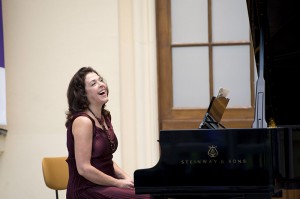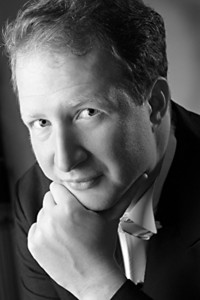An Interview with Elena Bashkirova
From 7 to 11 May, we will host a chamber music festival in the museum’s Glass Courtyard. Katharina Schmidt-Narischkin and Sylvia Winkler of our press office spoke in advance with the festival’s director Elena Bashkirova.
Press office JMB: As festival director, what themes have you chosen to emphasize this year?
Elena Bashkirova: Our themes have been determined this year by two anniversaries: on the one hand, the start of the First World War 100 years ago and its impact on music; on the other hand, the 150th birthday of Richard Strauss. Both anniversaries augur a varied program for “intonations”: 1914 saw an astonishing richness of musical styles, which our concerts will reflect. And Strauss composed chamber music nearly his entire life, so I have a wide range of pieces and genres to choose from.
Every year at “intonations,” chamber music classics can be heard together with unknown works. What composers should visitors expect to discover in this third season?
Rudi Stephan was an extraordinary discovery for me. I heard Music for Orchestra and Violin a few years ago here in Berlin. I was impressed and deeply touched by it. As I was putting together the programs for “intonations,” I found his gorgeous chamber music and was delighted to have the chance to present it here with my colleagues. Rudi Stephan died in the war when he was 28. Given his talent, he would otherwise have certainly provided us with more outstanding music.
There will also be another world premiere: the fourth concert, on Saturday 10 May, will open with David Coleman’s “Three pieces for clarinet and piano.” Another significant composer this year will be Karol Szymanowski. He has his own tonal language, writing hauntingly beautiful music that unfortunately is played much too seldom.
How do you manage to attract such renowned soloists as András Schiff and Radu Lupu, as well as members of leading international orchestras, to play at the festival?
A large number of the artists who appear at “intonations” have also played at my festival in Jerusalem. Over the years we’ve grown into a warmly interconnected artistic family. I have a lot of trust in my colleagues, from both the programming and the personnel perspectives. I’m always open to suggestions from them, as well as to discovering new young artists myself, whom I want to invite.

The chamber music festival “intonations: the Jerusalem International Chamber Music Festival” at the Jewish Museum Berlin 2013.
© Jewish Museum Berlin, Photo: Monika Rittershaus
There are a number of places in Berlin where you could play world-class chamber music. Why, of all these, have you decided on the Glass Courtyard at the Jewish Museum?
I don’t actually think that there are a lot of places suitable for chamber music. The halls are either too small or two large, or the acoustics simply don’t work. The Glass Courtyard at the Jewish Museum is a real discovery and a gem: the ideal size, paired with an incomparable atmosphere.
How does the festival connect Berlin and Jerusalem?
Well, the festival in Berlin bears the name of the Jerusalem festival in its subtitle, “intonations: the Jerusalem International Chamber Music Festival at the Jewish Museum Berlin.” “Intonations” is like the Jerusalem festival’s little brother for me: many of the artists feel as at home in Berlin as they do in Jerusalem, we play similar programs, and they have the same spirit. The Berlin program will also inform that of the Jerusalem Festival in Israel coming up in September.
Will the festival continue to occur in the coming years?
Yes. In fact we’ve already confirmed the dates for the fourth and fifth festivals in the museum’s Glass Courtyard: 18 – 23 April 2015 and 16 – 21 April 2016. We’re simply very lucky: our partnership with the sponsor Evonik has made it possible to plan in a way that truly isn’t to be taken for granted in this day and age.

